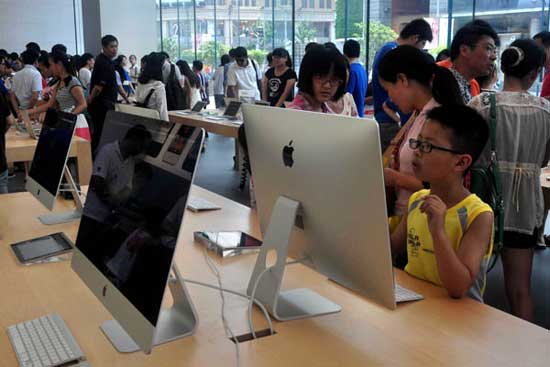
 |
| Many United States-based corporations, including Apple Inc, are increasingly dependent on China for sales. Apple now gets about 11 percent of its revenues from China, compared with 1.1 percent in 2009. [Photo / China Daily] |
One big thing to watch for this week will be the second-quarter earnings of certain Fortune Global 500 companies. A good lineup to start with would be Boeing Co, Caterpillar Inc, General Motors Co, 3M Co, United Technologies Corp and DuPont.
These United States-based companies are becoming increasingly dependent on their operations in China.
The definition of "dependent" in this case comes from The Economist's Sinodependency Index — an interactive graphic that gives a breakdown of revenues from China for US multinationals operating in the world's second-largest economy.
The 2013 Index, as of July, had some interesting facts. For example, technology companies — including Apple Inc, Qualcomm Inc, Intel Corp and IBM Corp — are receiving increasing revenues from the Chinese market.
Listed companies are more dependent on China than they were when the index was introduced in 2009. China, on average, accounted for 11.2 percent of revenues in 2012, up from 9.8 percent in 2009.
Apple, which tops the chart this year, got 11 percent of revenues (as of July) from China compared with 1.1 percent in 2009.
Consumer/non-cyclical companies such as Yum! Brands, Procter & Gamble Co, Coca-Cola Co and Johnson & Johnson are also seeing increasing revenues from China.
Zhu Zhiqun, a professor of political science and international relations at Bucknell University and author of US-China Relations in the 21st Century, said the index suggests a growing China influence on a number of S&P 500 companies.
"It signifies a more open Chinese market and a more interdependent relationship between the Chinese economy and Western economies," said Zhu.
Jon Taylor, a professor of political science at the University of St. Thomas in Houston, said: "I believe that this dependency can and will grow, primarily as a result of China shifting to a more knowledge- and consumption-based model for growth.
"Many multinational companies are banking on Chinese consumers to do for them in the coming decade what US and Western consumers have done in the past," Taylor said.
China's growing market in literally every industry provides promising opportunities for multinationals that want to be part of it, or expand their presence using China strategies to gain and win the market.
Companies that have larger revenues from the Chinese market can also have more exposure to investments and facilities in China.
"The implication is that perhaps US multinationals that are Sinodependent are potentially at risk of exposure if a real economic dip occurs in China," said Taylor.
Zhu suggested that one should not read "too much" into the index because, just like other indices, it is not a perfect measurement.
"After all, a company's share of revenues from China is also affected by other factors such as inflation, fluctuating exchange rates and changing operating costs in China as well as the performance of other economies where a company also operates and receives revenue," he explained.
Taylor called Wal-Mart Stores Inc a missing element in the index.
"The world's 15th-largest company (and number one by sales) purchases around 10 percent of all Chinese exports to the US and then marks them up by as much as a factor of 10 for resale in the United States, among other places, but ironically in China, too," said Taylor. "It is nowhere to be found in the index."
But the interactive graphic, which changes on a daily basis to show the movement — big or small — of multinational companies in China, perhaps in a way reflects the general sentiment of these companies. Everyone wants a success in China.
In a recent interview with China Daily, an executive from Otis Elevator Co (part of United Technologies), explained why it wants to be part of the China story.
"We have never seen economic development at such a scale and such a pace anywhere in history; every time I go China, I am fascinated," said Otis President Pedro Baranda, crediting his company's growth in China to urbanization.
















 China builds 'world's tallest building'
China builds 'world's tallest building'


![]()
